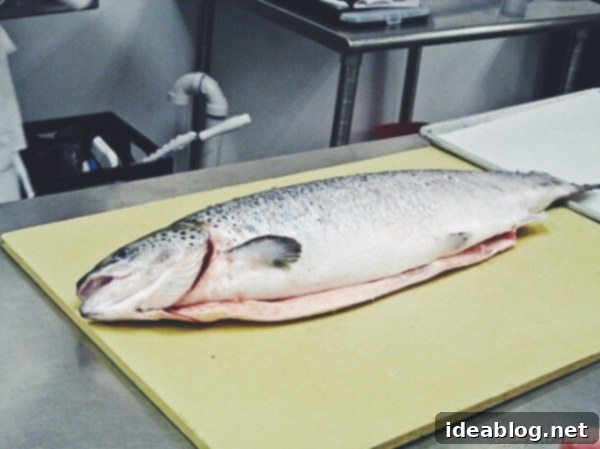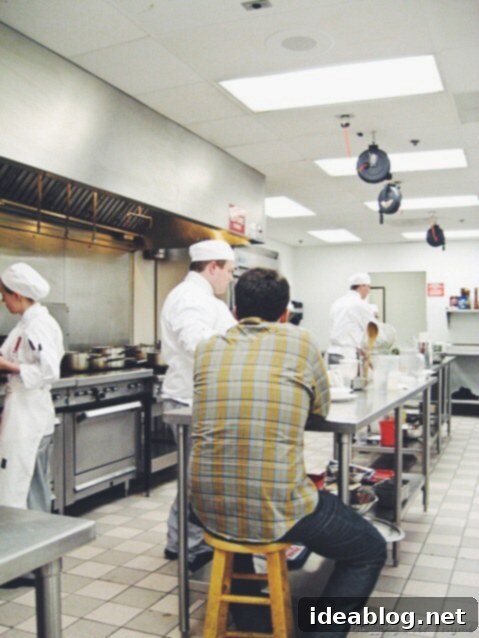Beyond the Restaurant Kitchen: My Unconventional Culinary School Journey and Career Path
There’s a curious irony in needing a mini-break from a mini-series, especially when the subject is one of the most profoundly personal and challenging topics I’ve ever attempted to articulate. This particular post, marking the culmination of my reflections, delves into a journey that, even to this day, invites questions and sparks conversations. Where does one even begin to unravel the complexities of passion, purpose, and a career path less traveled?
In the preceding installment of this series, I laid bare my experiences working within the demanding confines of a professional restaurant kitchen. It was an intense, formative period that offered invaluable insights into the industry’s heart and soul. Yet, amidst the clatter of pans and the heat of the line, a quiet realization began to dawn: my heart, though deeply appreciative of the craft, wasn’t wholly invested in the long-term grind of restaurant life. This wasn’t a sudden epiphany; in truth, the thought of becoming a restaurant executive chef had never fully resonated with my deeper aspirations. Still, acknowledging this truth was a pivotal moment. It complicated matters significantly, forcing me into a profound period of self-evaluation, where I had to meticulously prioritize different elements of my life and professional ambitions.
One might assume that had I fallen head-over-heels in love with the kitchen and envisioned myself there indefinitely, things would have been simpler. In many practical ways, they certainly would have. Sometimes, even now, I find myself idly wondering what “if.” However, I can state with absolute certainty that I harbor no regrets about the decision I made to step away from that particular path. It was a conscious choice, deeply considered, and ultimately, one that liberated me to explore other avenues where my culinary education could flourish in unexpected ways.

The Unexpected Announcement: Leaving the Restaurant Behind
I distinctly recall the night I delivered my two weeks’ notice to my chef, a moment etched vividly in my memory. It was just before service, a chaotic and high-stakes period in any professional kitchen, amplifying the tension of the conversation. I was genuinely terrified, bracing myself for the worst – perhaps even being unceremoniously dismissed on the spot, a reaction not entirely unheard of in such high-pressure environments. To my immense relief, she received my decision with a surprising degree of respect, a testament to her professionalism and perhaps, an understanding of the immense physical and emotional toll the industry can take.
However, her follow-up question lingered: what job was I leaving for? My response – a marketing communications position at a fine foods company – was met with an unmistakable, deeply confused look. It was a moment of profound disconnect. Her expression, devoid of malice but full of genuine bewilderment, spoke volumes. It silently questioned the very premise of attending culinary school only to pursue a non-restaurant job. “Who the heck goes to culinary school for that?” her eyes seemed to ask. My internal reply was a quiet, “Uhhh. Me, I guess.” And the truth was, deep down, I had anticipated this kind of reaction all along. My unconventional path was bound to raise eyebrows.
This exchange only solidified the recurring theme of my culinary journey: the widespread societal assumption that culinary education is a direct, exclusive pipeline to a restaurant kitchen. The bewildered looks that followed me, both literally from my chef and figuratively from countless others, highlighted a fundamental misunderstanding of the broader culinary landscape.
Challenging Perceptions: Culinary School Beyond the Stove
Indeed, I’ve come to realize that most people generally struggle to grasp the concept of investing in culinary education without the explicit aim of working in a restaurant kitchen. It often appears to be a contradiction in terms, an illogical detour from the perceived norm. There were even moments, I confess, when I myself questioned the logic, wondering if my choices made any sense in a world that seemed to expect a linear progression.
Over the years, especially since sharing more of my journey online, I’ve received countless emails posing that single, monumental question: “Was culinary school worth it?” And honestly, it’s a question I consistently grapple with, precisely because there isn’t a simple, universal answer. Its “worth” is profoundly subjective, intricately dependent on a multitude of individual factors that shape each person’s unique experience and goals.
Factors Shaping the “Worth It” Equation
To truly answer whether culinary school is “worth it,” one must consider the diverse paths and circumstances of aspiring students:
- Individual Goals: Some individuals enter culinary school with a crystal-clear vision of their desired career, be it a pastry chef, a food stylist, or a product developer. Others, like me, may have a broader interest in food but are still discovering their specific niche.
- Financial Investment: The cost of culinary education can be substantial, often requiring significant student loans. For others, financial aid or personal savings might mitigate this burden. The financial implications heavily influence the perceived return on investment.
- Career Aspirations: While many aim for a leg-up in the competitive restaurant industry, a growing number seek culinary degrees to gain credibility and foundational knowledge that serves them in entirely different capacities. This could include food writing, recipe development, culinary consulting, private chef work, food photography, or even entrepreneurial ventures in the broader food system.
- Life Stage and Experience: Some embark on this educational journey directly out of high school – a path I would strongly advise against without significant prior industry exposure. Others enroll as seasoned career-changers, bringing with them a wealth of life experience and a more mature understanding of their objectives.
Each of these factors intertwines, creating a unique context that ultimately determines the value and “worth” of a culinary education for any given individual.
My Personal Verdict: Why Culinary School Was Worth It For Me
For me, personally, I can wholeheartedly and unequivocally say that culinary school was worth it. Did I absolutely *have* to attend culinary school to arrive at my current professional standing? Probably not, in the strictest sense of necessity. However, its impact on my trajectory and overall development was undeniable and profoundly helpful.
The alternative, of course, would have been to forgo formal education altogether and immerse myself directly in a professional kitchen as a line cook, learning “on the job.” This is a perfectly valid and incredibly effective path for many, and I readily acknowledge its merits. You will undoubtedly acquire practical skills and an intimate understanding of kitchen operations in a restaurant environment that no school can fully replicate. The raw, unfiltered reality of service, the camaraderie, and the unforgiving pace teach lessons that are truly invaluable.
Yet, I knew deep down that “learning on the job” exclusively was not the right choice for *me*. My learning style and specific aspirations made a structured educational environment more appealing. What I learned in six intensive months at school, from foundational techniques and classical preparations to advanced culinary science and sanitation protocols, would likely have taken me years to piece together in the chaotic, often unforgiving, environment of a restaurant kitchen. Culinary school provided a comprehensive, accelerated curriculum that built a strong theoretical and practical foundation.
Beyond the technical skills, it instilled in me a crucial sense of confidence and a robust knowledge base, equipping me to navigate what is undeniably a pretty tough industry. Without that formal grounding, I’m genuinely not sure I would have possessed the resilience or the clarity to pursue the path I ultimately forged. It has profoundly shaped who I am today, fostering critical thinking, discipline, and a deeper appreciation for the culinary arts. Moreover, it provided an incredible network of instructors and peers, opening a myriad of doors and connecting me with opportunities I might never have discovered otherwise.
Crucial Advice for Aspiring Culinary Students
My most significant piece of advice for anyone contemplating whether or not to attend culinary school boils down to two critical points:
- Define Your “Why”: Truly take the time to reflect on what you hope to achieve at the end of your culinary journey. What specific skills do you want to acquire? What kind of career do you envision? Will culinary school genuinely help you reach those specific goals, or are there alternative, more direct routes? Be honest with yourself about your long-term vision, even if it evolves.
- Gain Real-World Experience FIRST: This cannot be stressed enough. Before committing to a costly and time-consuming culinary program, seek out at least some hands-on experience in a professional kitchen. Stage (unpaid internship), work as a prep cook, or find any entry-level position that offers exposure to the day-to-day realities. This firsthand experience is vital for a true understanding of the physical demands, the fast-paced environment, the long hours, and the unique culture of a commercial kitchen. If, after experiencing this reality, you still feel a passion for the work, or if you still firmly believe that formal education will provide invaluable context and skills for your chosen path, *then* proceed with confidence to enroll in culinary school.
And always remember, the food industry is an incredibly vast and diverse world. Restaurant kitchens, while iconic and integral, represent only a tiny fraction of the immense opportunities available within this dynamic sector. Your culinary education can be a springboard to so many exciting and unconventional roles, far beyond the traditional chef’s whites.
Thank you for taking the time to read through these reflections and for accompanying me on this journey of self-discovery and culinary exploration.
